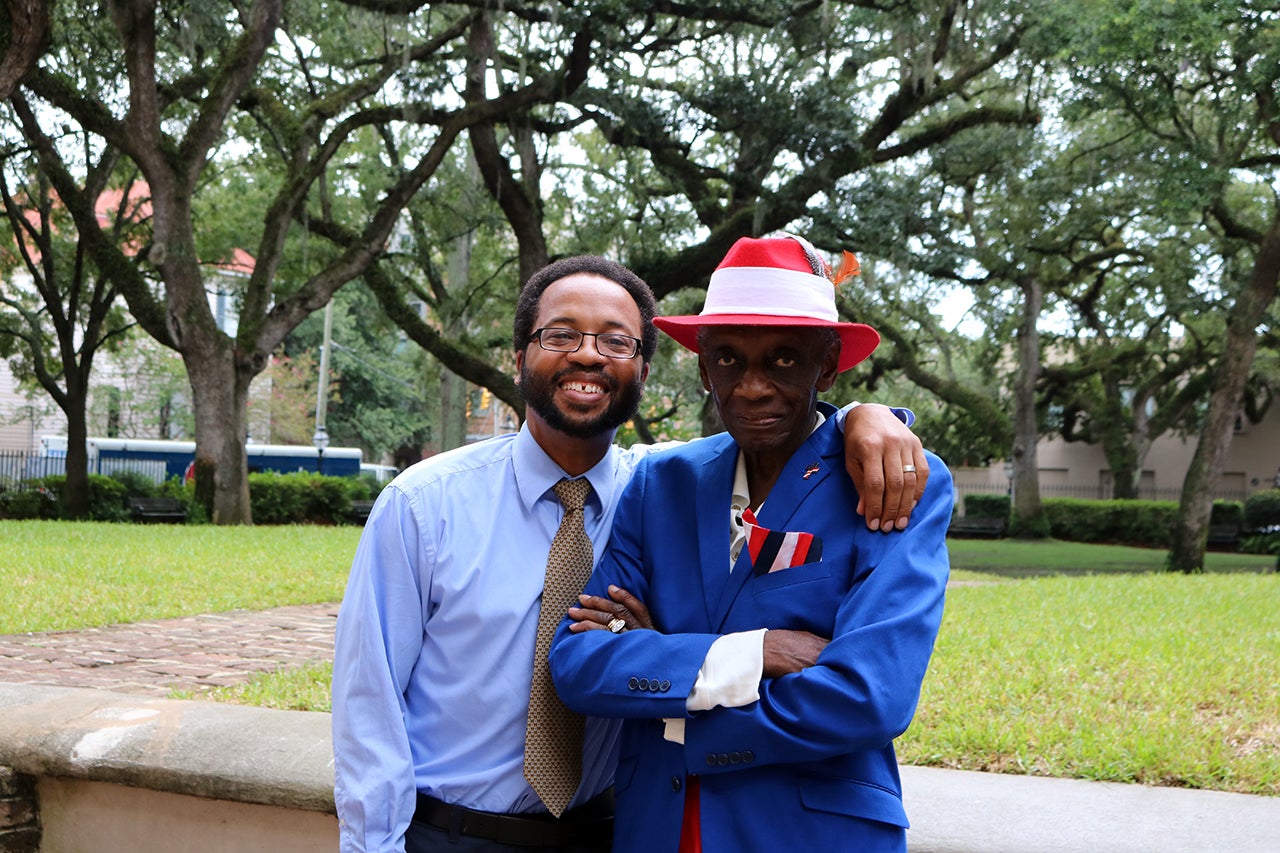In 2012, as a graduate student in English at the College of Charleston, Michael Owens was assigned to interview World War II Army veteran Rollins Edwards for an oral history project. He was captivated by Edwards’ story of being subjected to chemical testing with mustard gas by the U.S. government at Camp Claiborne, Louisiana, and he knew it was a story that others had to hear.
“I heard a snippet of his story and was upset that no one had talked about this before,’” says Owens.
Now an adjunct professor of English at the College, Owens recently wrote a book about Edwards. Burned: Conversations with a Black WWII Veteran provides gruesome details of the torture and discrimination Edwards faced while serving his country. Edwards served in the 1329 General Service Regiment, which was comprised of a group of engineers who built roads and bridges and also carried supplies off and on the battlefield. He served in both European and Pacific theaters. He was threatened with jail time if he spoke about his experience of being an experimental guinea pig in chemical warfare tests. His story had been hidden for 50 years before investigations brought to light the injustices he and other African Americans underwent.
On a recent fall day in Cistern Yard, Edwards, wearing red dress pants, a blue suit jacket and a red and white fedora, shared stories about his service days. Once he traveled to Paris to see the Eiffel Tower because he didn’t think he’d ever get to see it. Suddenly he heard a voice ask, “‘You soldiers don’t salute officers?’ It was General George Patton, senior officer of U.S. Army during WWII. “You talk about some fellas coming to attention,” Rollins recalls with a laugh.
“You ever seen a picture of General Patton? Would you like to?” he asks. He pulls out a medallion he keeps in his wallet with a picture of Patton on it. That’s not the only things he keeps in his wallet, which is better described as a portable museum. Other items of value? A photo of Patton’s grandson and two laminated documents dated from when he crossed the International Dateline.
Burned was no easy feat for Owens to complete. In fact, he struggled most of the time writing it, not just because Edwards’ story was upsetting to hear, but because it isn’t one of fiction, which Owens was more accustomed to writing.
“I consider myself a decent writer but it was a challenge to represent him the right way [because] he’s already been abused, tortured, taken advantage of, and robbed, literally, because they won’t give him all of his compensation. [Not to mention] the racism and discrimination of the 1940’s,” says Owens. He adds, “Trying to capture all that and make it believable, that was one of the toughest things I’ve ever had to write.”
For Edwards, getting his story out there is something he never imagined happening, especially at the age of 95.
“It means a lot,” says Edwards. “We get calls from California and New York and I never thought at my age, now, I would ever have anybody even [think] of writing a book of any kind. It’s been so long.”
He rolls up the left sleeve of his jacket to show off the white marking on his left wrist which he calls his “tattoo.” It’s physical proof of the mustard gas testing he endured.
RELATED: Read an NPR story about WWII veteran Rollins Edwards.
Today, Owens runs a non-profit called Voices Speak to help others like Edwards get their stories out and to overcome factors such as disabilities or race that may have kept them from telling their stories in the past.
Owens has also developed a special topics summer course at the College to teach students about oral history as a complement to written history.
“Everything, even written history, has been orally told at one point. Somebody had to remember it, somebody had to repeat it, somebody had to record it. But that’s all filtered,” says Owens.
History is written by the victors and that isn’t enough for Owens, who hopes this course lets students “democratize” history.
“This course is a complementary history class. It’s not a replacement of history. It’s a comparison of what’s in books and the first hand stories of people who lived during those times. You can piece it all together to get a complete picture of history. We listen to oral histories, we analyze them, we write about them,” says Owens.
And in the case of the remarkable history being shared by Edwards, students get to hear stories straight from the source when Edwards visits Owens’ classes.
“He helps bridge the generational gaps – the students love him,” Owens says. “Oral history isn’t even really about accuracy; it’s about how that person was feeling at that time. That’s the history – the emotion, rather than the specific dates and times.”
With the aid of Burned, his non-profit and his oral history class, Owens hopes to impress upon his students the value of interacting with people who have lived extraordinary lives, including military veterans like Edwards.
“We should respect and admire all the veterans for what they’ve done, not just certain winners,” says Owens. “There’s no way to find out about those stories unless you actually talk to them and ask them questions. Take an active role in knowing more.”
Feature photo by Amanda Kerr.
Lilly Frederick is a junior from San Diego studying English and creative writing at the College of Charleston. She is also an Orientation Intern for the Office of New Student Programs.






